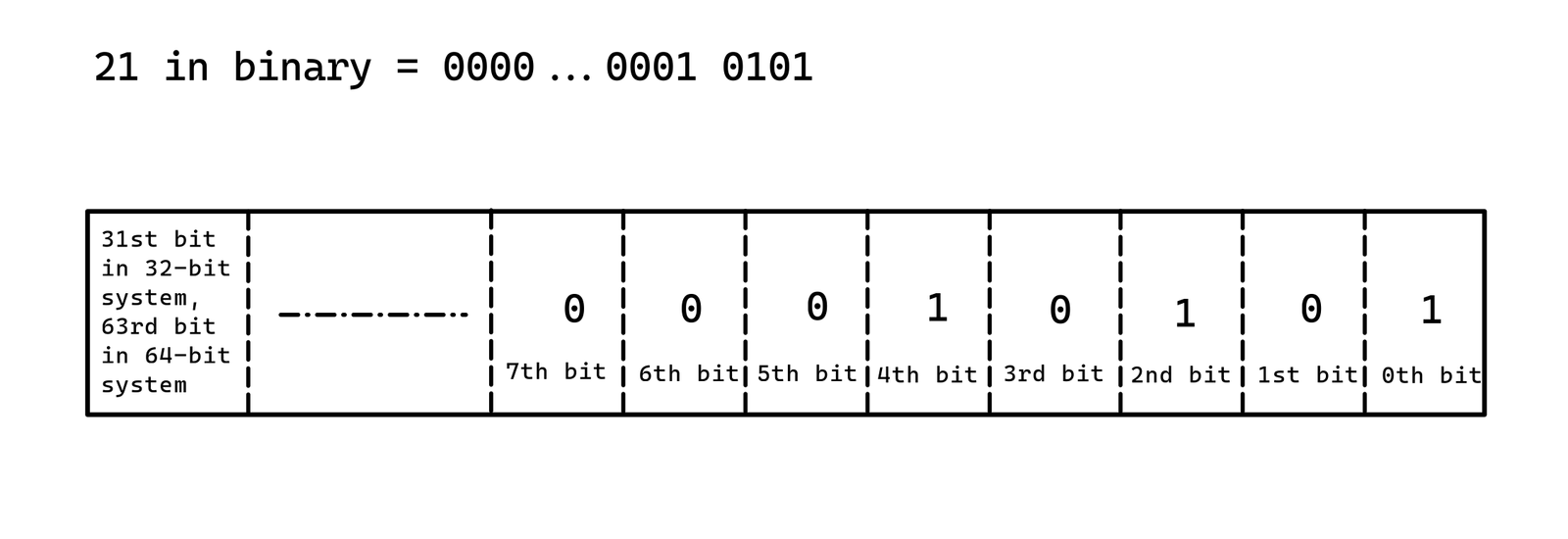Problem Statement
Sometimes, it becomes essential to check whether a specific bit is set (equals 1) or not in a binary representation of a number. Let's consider the problem of determining if the k'th bit is set in a given number. Given an integer num and a positive integer k, our task is to find out whether the k'th bit is set or not.
Understanding the Problem
Consider the following scenario:
Input: num = 21, k =3
Our goal is to check if the 3rd bit (from the right, considering 0-based index) is set in the binary representation of 21.
Binary representation of 21: 10101.
Here, the 3rd bit is set (equals 0). So, for the given input, the expected output should be false.Examples
Example 1:
Input: n = 5, k = 0
Output: true
Explanation: Binary of 5 = 0000...0101 -> 0th bit is 1Example 2:
Input: n = 5, k = 1
Output: false
Explanation: Binary of 5 = 0000...0101 -> 1st bit is 0Example 3:
Input: n = 5, k = 2
Output: true
Explanation: Binary of 5 = 0000...0101 -> 2nd bit is 1Different Approaches
1️⃣ Bit Manipulation (bitwise AND)
To solve this problem efficiently, we can use bitwise AND operation (&) along with the left shift operation (<<).
The idea is to create a mask with the k'th bit set and then perform a bitwise AND operation with the given number. If the result is not zero, then the k'th bit is set; otherwise, it is not set.
Approach:
- Create a mask:
1 << k→ This shifts 1 to thek-thposition. - Perform
n & (1 << k):- If result ≠ 0 → bit is set.
- If result == 0 → bit is not set.
Edge Case:
- If
kis negative or too large (beyond 31 or 63 depending on the system), handle gracefully.
Bit Position:

Code:
#include <iostream>
bool isKthBitSet(int num, int k) {
// Create a mask with the k'th bit set
int mask = 1 << k;
// Perform bitwise AND operation
// If result is not zero, k'th bit is set
return (num & mask) != 0;
}
int main() {
// Example usage
int num = 21, k = 3;
// Check if the k'th bit is set
if (isKthBitSet(num, k)) {
std::cout << "The " << k << "'th bit is set in " << num << std::endl;
} else {
std::cout << "The " << k << "'th bit is not set in " << num << std::endl;
}
return 0;
}
// Output
21 in binary = 0001 0101
The 3'th bit is not set in 21Complexity Analysis:
- Time Complexity:
O(1)Each operation is constant time. - Space Complexity:
O(1)No extra space used.
